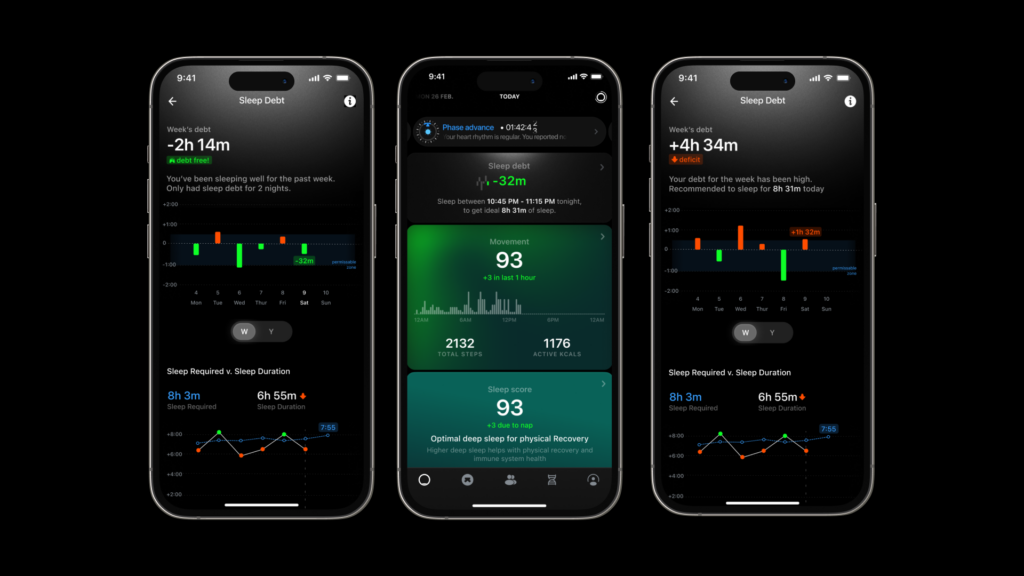Are you having a tough week at work and falling behind on sleep? Perhaps you’re navigating the challenges of parenthood with a restless toddler, or maybe you’re simply burning the midnight oil. Regardless of the reason, you may not realize it, but you are in debt—to your sleep!
Sleep allows the body to rest and recover. During sleep, the brain clears out toxins that accumulate during waking hours, which may help prevent neurodegenerative diseases.
Sleep is essentially categorised into Rapid Eye Movement sleep (REM) and Non-Rapid Eye Movement sleep (N-REM). Each stage of sleep serves different purposes in all of these processes, ranging from reducing stress on the heart, and glucose regulation to playing a crucial role in cognitive function, consolidating memories and enhancing learning.
If you have inconsistent or insufficient sleep, you could be in sleep debt.
You are not alone though!
Approximately 62% of adults worldwide report insufficient sleep, meaning they don’t meet the recommended 7-9 hours of sleep per night. The worst part? Most don’t even know it.
When it comes to sleep, the debt is easy to accumulate but hard to pay back.

Take control of your Sleep Debt
Sleep debt on the Ultrahuman Ring AIR is a novel way to understand your personalised sleep needs. It empowers you to manage your sleep debt and improve your overall sleep efficiency.
Here’s how you can manage your sleep debt:
- Monitor your sleep duration against your debt to improve sleep quality.
- Receive tailored nudges to promote better sleep habits.
- Manage your sleep schedule with weekly resets of your sleep debt.
Even if you’re pressed for time, allocate a specific window for sleep and maintain discipline around a minimum sleep time. This approach can significantly improve your sleep efficiency and solidify your health’s foundation.
How is Sleep Debt calculated on the Ring AIR?
The Ring AIR has established a sleep baseline from your personalised sleep patterns. Your sleep debt is derived from the cumulative difference between this baseline and the number of hours you’ve slept.
Depending on this you either have a surplus or are in debt to your sleep. This helps you track when you’re falling behind and by how much. Your sleep debt also has an adverse effect on your sleep efficiency.
Hence, if you have accumulated sleep debt, then your sleep efficiency in all likelihood has taken a hit as well. Furthermore, sleep debt resets itself every week enabling you to start afresh. This debt isn’t pre-defined but is personalised to your sleep needs. This allows you to actively leverage this capability to take charge of your sleep.
Read next: The power of naps explained

How to improve your Sleep Debt?
To address sleep debt effectively, consider the following strategies based on scientific evidence
Prioritize Consistent Sleep: Maintain a regular sleep schedule to regulate your body’s internal clock.
Incorporate Relaxation Techniques: Wind down before bed with activities like reading or listening to calming music to prepare your body for sleep.
Opt for Physical Activity: Engage in resistance exercises to counteract the negative effects of sleep debt on muscle health.
Create a Sleep-Conducive Environment: Ensure your bedroom is dark, cool, and free of distractions to promote quality sleep.
Seek Professional Help: Consult a healthcare provider if sleep issues persist to address potential sleep disorders or explore treatment options like sleep aids or a sleep study.
By implementing these strategies, you can work towards reducing sleep debt and improving your overall sleep quality, which is crucial for overall health and well-being.
The Hidden Cost of Sleep Debt
Cognitive performance
Lack of sleep impacts your brain. Studies show that sleep deprivation affects attention, memory, decision-making, and overall brain function. Sleepiness at the wheel is responsible for up to 30% of road accidents, according to a research paper by Pierre Philip and Patricia Sagaspe (2011).
Cardiovascular health
Irregular sleep patterns can harm your heart. Chronic sleep disturbances are linked to higher risks of cardiovascular diseases. Research by Chengjie Zhang and Gang Qin (2023) indicates that people with irregular sleep patterns are more likely to develop hypertension, heart disease, stroke, and other cardiovascular conditions.

Hormonal imbalance
Insufficient or inconsistent sleep can cause hormonal imbalance in your body, which can in turn have a series of negative effects on your body.
- Disrupted production of growth hormone: Growth hormone is primarily released during deep sleep stages. When sleep is insufficient or of poor quality, its production can be significantly affected.
- Altered levels of hunger-regulating hormones: Sleep deprivation affects two key hormones that regulate appetite and satiety, namely Ghrelin (the “hunger hormone”) and Leptin (the “satiety hormone”)
The combination of these hormonal disruptions can create a cycle that promotes weight gain and metabolic issues, potentially contributing to obesity and related health problems if sleep deprivation becomes chronic.
Weakened Immune system
Insufficient or inconsistent sleep has repercussions on your body that weakens the immune system.
- Reduced production of immune cells: Fewer T-cells, which are crucial for fighting off infections and decreased production of natural killer cells that target virus-infected cells and cancer cells
- Impaired cytokine production: Cytokines are proteins that help regulate immune responses and sleep deprivation can alter the balance of pro-inflammatory and anti-inflammatory cytokines
- Increased inflammation: Chronic sleep loss can lead to low-grade systemic inflammation and this can contribute to various health issues, including cardiovascular diseases.
Skin Health
Insufficient or inconsistent sleep has repercussions on the health of your skin. Some of them are:
- Accelerated aging: Reduced collagen production, leading to less skin elasticity can in turn lead to increased fine lines and wrinkles. Additionally, getting inconsistent or insufficient sleep can also cause slower cell turnover, resulting in duller-looking skin
- Impaired barrier function: The skin’s ability to retain moisture decrease which results in increased transepidermal water loss, leading to dryness. This leads to greater susceptibility to environmental stressors and irritants
- Inflammation: Sleep deprivation can trigger inflammatory responses in the skin which can exacerbate conditions like acne, eczema, and psoriasis
- Uneven skin tone: Poor sleep can lead to increased cortisol production which can cause increased melanin production, resulting in dark spots or uneven pigmentation
Tracking ‘Sleep Debt’ on the Ring AIR enables you to consistently monitor and manage your cumulative sleep deficiency. By providing clear, actionable data on sleep patterns, it allows you to make informed decisions about your rest and recovery. Regularly using this capability on the Ring AIR and addressing Sleep Debt can lead to improved sleep habits, potentially resulting in enhanced cognitive function, better physical health, and increased overall well-being over time.
Do you have Sleep Debt? Head to the Ultrahuman app to find out.








